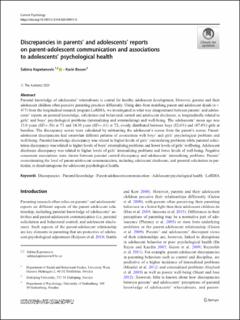Discrepancies in parents' and adolescents' reports on parent-adolescent communication and associations to adolescents' psychological health
Peer reviewed, Journal article
Published version
Permanent lenke
https://hdl.handle.net/11250/3031243Utgivelsesdato
2020Metadata
Vis full innførselSamlinger
Originalversjon
10.1007/s12144-020-00911-0Sammendrag
Parental knowledge of adolescents’ whereabouts is central for healthy adolescent development. However, parents and their adolescent children often perceive parenting practices differently. Using data from matching parent and adolescent dyads (n = 477) from the longitudinal research program LoRDIA, we investigated in what way disagreement between parents’ and adolescents’ reports on parental knowledge, solicitation and behavioural control and adolescent disclosure, is longitudinally related to girls’ and boys’ psychological problems (internalizing and externalizing) and well-being. The adolescents’ mean age was 13.0 years (SD = .56) at T1 and 14.30 years (SD = .61) at T2, evenly distributed between boys (52.6%) and (47.4%) girls at baseline. The discrepancy scores were calculated by subtracting the adolescent’s scores from the parent’s scores. Parent adolescent discrepancies had somewhat different patterns of associations with boys’ and girls’ psychological problems and well-being. Parental knowledge discrepancy was related to higher levels of girls’ externalizing problems while parental solicitation discrepancy was related to higher levels of boys’ externalizing problems and lower levels of girls’ wellbeing. Adolescent disclosure discrepancy was related to higher levels of girls’ internalizing problems and lower levels of well-being. Negative concurrent associations were shown between parental control discrepancy and adolescents’ internalizing problems. Parents’ overestimating the level of parent-adolescent communication, including adolescent disclosure, and parental solicitation in particular, is disadvantageous for adolescent psychological health.
Tidsskrift
Current PsychologyBeslektede innførsler
Viser innførsler beslektet ved tittel, forfatter og emneord.
-
Are adolescent elite athletes less psychologically distressed than controls? A cross-sectional study of 966 Norwegian adolescents.
Rosenvinge, Jan H; Sundgot-Borgen, Jorunn; Pettersen, Gunn; Martinsen, Marianne; Stornæs, Annett Victoria; Pensgaard, Anne Marte (Journal article; Peer reviewed, 2018)Introduction: Psychological distress is increasing among adolescents and clusters with other mental health problems such as eating problems. The aim of this study was to investigate the prevalence of psychological distress ... -
Impacts of alcohol consumption by mothers and fathers, parental monitoring, adolescent disclosure and novelty-seeking behaviour on the likelihood of alcohol use and inebriation among adolescents
Berglund, Kristina J.; Boson, Karin Margareta Mellberg; Wennberg, Peter; Gerdner, Arne (Peer reviewed; Journal article, 2022)The aim of this prospective cohort study was to examine how alcohol consumption by mothers and fathers, parental monitoring (knowledge, control, and solicitation), adolescent disclosure and novelty seeking were associated ... -
Medical benefits in young adulthood: a population-based longitudinal study of health behaviour and mental health in adolescence and later receipt of medical benefits
Sagatun, Åse; Heyerdahl, Sonja; Wentzel-Larsen, Tore; Lien, Lars (Journal article; Peer reviewed, 2015)Objectives To examine the extent to which smoking, alcohol, physical activity and mental health problems in 15–16-year-olds are associated with receipt of medical benefits in young adulthood, after adjustment for confounders. ...

